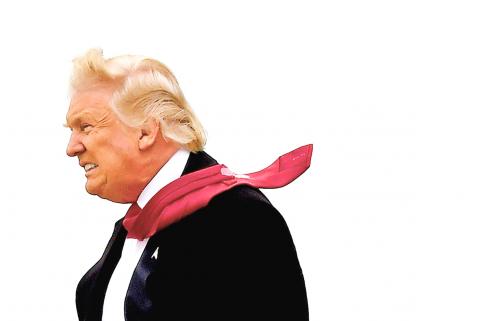US president-elect Donald Trump on Thursday warned hat US companies would face “consequences” for outsourcing jobs abroad, as he touted his early success in persuading an air-conditioner maker to keep about 1,000 jobs in the US rather than move them to Mexico.
“Companies are not going to leave the United States anymore without consequences. Not going to happen,” the US Republican said on a visit to a Carrier Corp plant in Indianapolis, Indiana.
Trump, who takes office on Jan. 20, did not say what the consequences would be, but he frequently threatened during the election campaign that his administration would put a 35 percent import tariff on goods made by US manufacturers that moved jobs offshore.

Photo: AFP
It is unclear what steps would have to be taken by US authorities before Trump could retaliate against individual companies shifting jobs abroad.
Trump also did not address whether Carrier’s parent company, United Technologies Corp, would face any consequences for continuing with plans to move 1,300 other Indiana jobs to Mexico.
Trump made keeping jobs in the US one of the main issues of his campaign and frequently pilloried Carrier for planning to move production to Mexico as he appealed to blue-collar voters in the Midwest.
Apparently under pressure from Trump, Carrier announced this week it had agreed to keep more than 1,000 jobs at the plant and at its headquarters, while still planning to move more than 1,000 other US jobs to Mexico.
Trump said his negotiations with the manufacturer were a model for how he would approach other US businesses that are tempted to move jobs overseas to save money.
He pledged to create a healthy environment for business through lower taxes and fewer regulations.
“I just want to let all of the other companies know that we’re going to do great things for business. There’s no reason for them to leave anymore,” Trump said.
If that approach did not work, there would be penalties, Trump warned.
Trump toured the plant in Indianapolis and shook hands with workers on an assembly line. Some workers yelled: “Thank you Mr Trump” and “Thanks Donald” as he greeted them.
Carrier confirmed that Indiana agreed to give the company US$7 million in tax incentives.
A source briefed on the matter said the tax incentives were over 10 years and the company had agreed to invest US$16 million in the state, where Trump’s vice president-elect, Mike Pence, is governor.
Carrier still plans to move 600 jobs from the plant to Mexico, the Wall Street Journal said.
Reuters reported earlier this week that Carrier also still intended to close a factory in Huntington, Indiana, that employs 700 people making controls for heating, cooling and refrigeration and move the jobs to Mexico by 2018.
Despite Trump’s deal, employers elsewhere in Indiana are laying off five times that many workers because of foreign competition.

The US dollar was trading at NT$29.7 at 10am today on the Taipei Foreign Exchange, as the New Taiwan dollar gained NT$1.364 from the previous close last week. The NT dollar continued to rise today, after surging 3.07 percent on Friday. After opening at NT$30.91, the NT dollar gained more than NT$1 in just 15 minutes, briefly passing the NT$30 mark. Before the US Department of the Treasury's semi-annual currency report came out, expectations that the NT dollar would keep rising were already building. The NT dollar on Friday closed at NT$31.064, up by NT$0.953 — a 3.07 percent single-day gain. Today,

‘SHORT TERM’: The local currency would likely remain strong in the near term, driven by anticipated US trade pressure, capital inflows and expectations of a US Fed rate cut The US dollar is expected to fall below NT$30 in the near term, as traders anticipate increased pressure from Washington for Taiwan to allow the New Taiwan dollar to appreciate, Cathay United Bank (國泰世華銀行) chief economist Lin Chi-chao (林啟超) said. Following a sharp drop in the greenback against the NT dollar on Friday, Lin told the Central News Agency that the local currency is likely to remain strong in the short term, driven in part by market psychology surrounding anticipated US policy pressure. On Friday, the US dollar fell NT$0.953, or 3.07 percent, closing at NT$31.064 — its lowest level since Jan.

The New Taiwan dollar and Taiwanese stocks surged on signs that trade tensions between the world’s top two economies might start easing and as US tech earnings boosted the outlook of the nation’s semiconductor exports. The NT dollar strengthened as much as 3.8 percent versus the US dollar to 30.815, the biggest intraday gain since January 2011, closing at NT$31.064. The benchmark TAIEX jumped 2.73 percent to outperform the region’s equity gauges. Outlook for global trade improved after China said it is assessing possible trade talks with the US, providing a boost for the nation’s currency and shares. As the NT dollar

The Financial Supervisory Commission (FSC) yesterday met with some of the nation’s largest insurance companies as a skyrocketing New Taiwan dollar piles pressure on their hundreds of billions of dollars in US bond investments. The commission has asked some life insurance firms, among the biggest Asian holders of US debt, to discuss how the rapidly strengthening NT dollar has impacted their operations, people familiar with the matter said. The meeting took place as the NT dollar jumped as much as 5 percent yesterday, its biggest intraday gain in more than three decades. The local currency surged as exporters rushed to